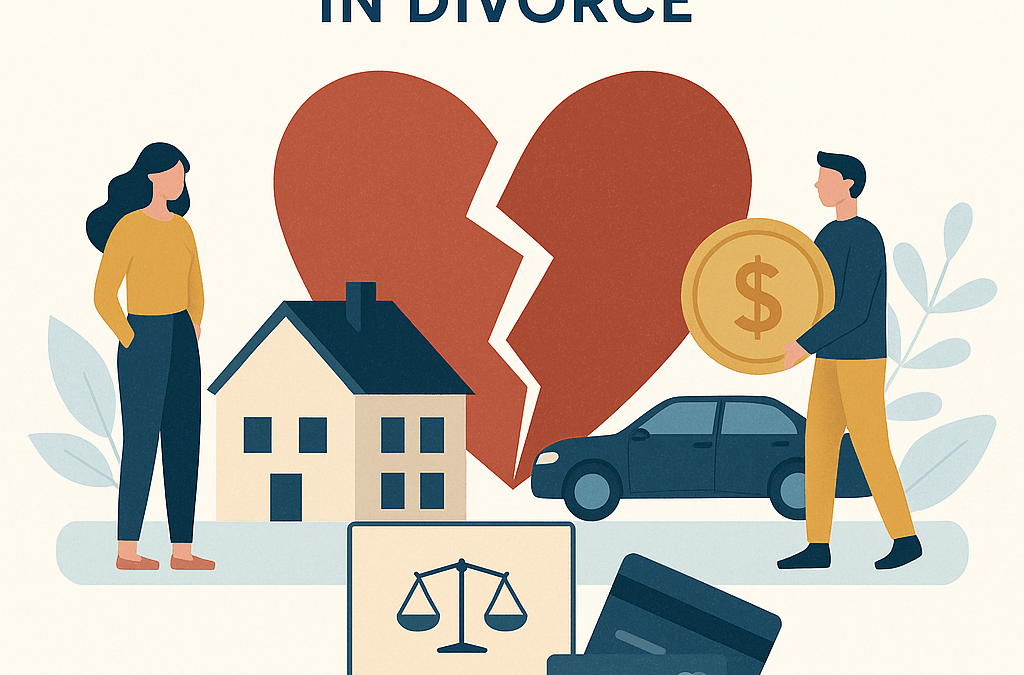When you’re going through a divorce, it’s not just the emotional part that’s hard—it’s the financial untangling, too.
One of the biggest questions we get from clients is:
“What happens to our stuff?”
And it’s a fair question. You’ve built a life together. Now it’s time to divide it—and you want to make sure it’s fair.
Let’s break down how property division works in Georgia, and what you need to know to protect what’s yours.
Georgia Is an “Equitable Distribution” State
Here’s what that means:
Property is not automatically split 50/50.
Instead, the court looks at what’s fair, which can be 50/50—but doesn’t have to be.
The goal is an equitable (fair and reasonable) division, not necessarily an equal one.
There Are Two Kinds of Property in a Divorce
Marital Property
This includes most things you or your spouse earned or bought during the marriage, no matter whose name is on it.
Examples:
- The house you bought together
- Cars, furniture, and appliances
- Bank accounts
- Retirement accounts and pensions
- Debts (yes, even those count!)
Separate Property
This is what you had before the marriage, or what you received as a gift or inheritance that was just for you.
Examples:
- A car you owned before getting married
- A family heirloom left to you by a grandparent
- Inheritance money you kept in your own name
But be careful: If you mixed separate property with marital property (like putting inheritance money into a joint account), it might be considered shared.
What Do Judges Look At When Dividing Property?
If you can’t agree on how to divide things, a judge will make the call. And they’ll consider things like:
- Each spouse’s financial situation
- Who contributed what (money or non-financial support, like staying home with kids)
- Length of the marriage
- Whether one person wasted or hid money
- Who gets custody of the kids (which might affect who stays in the home)
Example: If one spouse earns significantly more or one has primary custody of the kids, the court may award them a larger share of certain assets—especially the family home.
What About the House, Cars, and Debt?
Here’s how some of the big-ticket items are typically handled:
The House
- If you have kids, the parent with primary custody may be awarded the home (at least temporarily)
- Sometimes, the home is sold and the proceeds are split
- If one person keeps it, they often have to refinance it in their own name
Cars
- Usually go to the person who drives them
- But the value can be factored into the overall asset split
Debt
- Debt is divided just like assets
- If it was incurred during the marriage, it’s usually considered shared—even if only one person’s name is on it
What If You Already Agree on Who Gets What?
Great! That’s the best-case scenario.
If both parties agree on how to divide everything, you can create a settlement agreement and submit it to the court as part of an uncontested divorce. The judge will usually approve it—as long as it seems fair.
But even if you agree, you still need to put it in writing. And it has to be done the right way to avoid legal or financial problems later (like unpaid debts or disputes over titles).
Why Legal Help Matters with Property Division
We get it—this part can be overwhelming. But it’s also one of the most important parts of your divorce. Mistakes here can cause:
⚠️ Credit damage
⚠️ Unpaid tax surprises
⚠️ Lawsuits over who owns what
⚠️ Emotional headaches long after the divorce is final
At Catherine Ryan Law, we help you:
- Identify what’s marital vs. separate
- Make sure nothing gets overlooked
- Draft a clean, enforceable agreement
- Protect your financial future—especially if things are amicable now, but could turn tense later
Dividing Property Doesn’t Have to Divide Everything
The end of a marriage doesn’t have to mean financial chaos. With the right guidance, you can divide property fairly, protect your peace, and walk away with clarity.
Click here to schedule a consultation with Catherine Ryan
Let us help you move forward—calmly, clearly, and with confidence.

